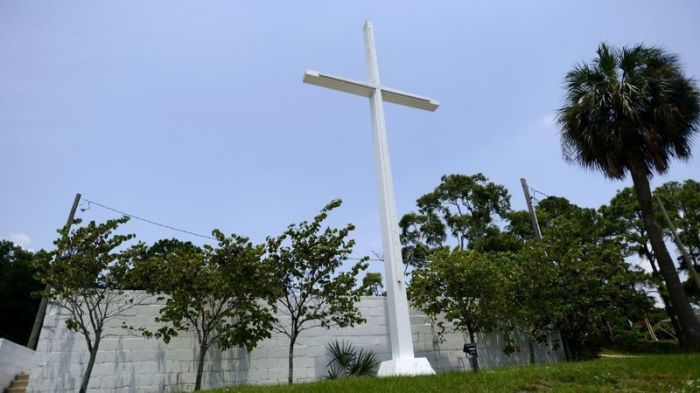Cross can stay at Florida public park, circuit court panel rules

A 34-foot tall cross can remain at a public park in Florida, according to a ruling from a three-judge panel that reversed an earlier decision from the same appeals court.
The panel with the U.S. Court of Appeals for the Eleventh Circuit ruled Wednesday that the cross at Bayview Park in Pensacola could remain.
Circuit Judge Kevin Newsom, author of the panel opinion, noted that they reversed an earlier ruling against the cross because of a remand from the U.S. Supreme Court.
“In September 2018 … we affirmed a district court’s decision ordering the removal of a 34-foot Latin cross from the city of Pensacola’s Bayview Park on the ground that the city’s maintenance of the cross violated the First Amendment’s Establishment Clause,” wrote Newsom.
The judge noted that the city appealed the decision to the Supreme Court and after the highest court in the nation concluded that a cross in Bladensburg, Maryland, could remain on public land, they “vacated our earlier decision, and remanded for further consideration.”
“First, plaintiffs have provided no evidence of the sort of discriminatory intent that would warrant invalidating a presumptively constitutional monument,” continued Newsom.
“Second, plaintiffs offer no evidence of deliberate disrespect in the monument’s design. There is nothing unique — let alone uniquely disrespectful — about the Bayview Park cross.”
Becket, a religious liberty law firm that represented Bayview in the litigation, celebrated the new opinion, giving credit to the Supreme Court for their Bladensburg ruling.
“The Supreme Court has now made clear that religious symbols are an important part of our nation’s history and culture,” said Luke Goodrich, vice president and senior counsel at Becket, in a statement released Wednesday.
The Freedom From Religion Foundation, which along with the American Humanist Association brought the lawsuit on behalf of a few residents, denounced the decision.
“It is not ‘hostile to religion’ to uphold government neutrality over religion. Bayview Park is not a Christian park, Pensacola is not a Christian city and the United States is not a Christian nation,” stated FFRF Co-President Annie Laurie Gaylor.
“Tax-exempt church property abounds where this cross belongs. Its presence in a city park sends a message that Christian citizens are insiders, and the rest of us are outsiders — and that’s an alarming message.”
Known as Kondrat'yev, et al v. City of Pensacola, the case regarded a large cross that has stood at Bayview Park since 1969, replacing an older wooden cross put up in 1941.
In May 2016, Amanda Kondrat'yev, Andreiy Kondrat'yev, David Suhor, and Andre Ryland filed a lawsuit against the cross, arguing that it did not belong in the park.
In June 2017, U.S. District Judge Roger Vinson ruled against the cross, concluding that it failed the Lemon Test, which says state-supported religious entities must have a secular purpose.
Despite the favorable ruling for the plaintiffs, Vinson also wrote that he believed the founders of the U.S. "would have most likely found this lawsuit absurd."
"And if I were deciding this case on a blank slate, I would agree and grant the plaintiffs no relief. But, alas, that is not what we have here," he concluded.
"I am aware that there is a lot of support in Pensacola to keep the cross as is, and I understand and respect that point of view. But the law is the law."
In September 2018, a three judge panel of the Eleventh Circuit unanimously ruled against the cross, with the panel stating that they were “constrained” by legal precedent.
The Supreme Court remand that vacated the September 2018 ruling stemmed from the case American Legion v. American Humanist Association.
In the case, the high court ruled 7-2 that a large cross honoring World War I veterans could remain at a public memorial in Bladensburg, Maryland.
Justice Samuel Alito, who authored most of the multi-part majority opinion, stated that “there is no evidence of discriminatory intent in the selection of the design of the memorial or the decision of a Maryland commission to maintain it.”
“The Religion Clauses of the Constitution aim to foster a society in which people of all beliefs can live together harmoniously, and the presence of the Bladensburg Cross on the land where it has stood for so many years is fully consistent with that aim,” he added.




























